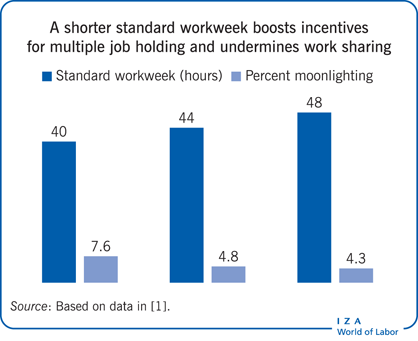Elevator pitch
Regulation of standard workweek hours and overtime hours and pay can protect workers who might otherwise be required to work more than they would like to at the going rate. By discouraging the use of overtime, such regulation can increase the standard hourly wage of some workers and encourage work sharing that increases employment, with particular advantages for female workers. However, regulation of overtime raises employment costs, setting in motion economic forces that can limit, neutralize, or even reduce employment. And increasing the coverage of overtime pay regulations has little effect on the share of workers who work overtime or on weekly overtime hours per worker.
Key findings
Pros
Regulation of standard workweek hours and overtime hours and pay can protect workers who might otherwise be required to work more than they would like to at the going rate.
Shortening the legal standard workweek can potentially raise employment, especially among women.
Shortening the legal standard workweek can increase the straight-time hourly wages of some workers.
Shortening the legal standard workweek permits more time for leisure and for home production.
Limiting overtime might benefit women workers, especially managerial workers, through an induced reorganization of work time.
Cons
Curbing overtime reduces employment of both skilled and unskilled workers.
Overtime workers tend to be more skilled, so unemployed and other workers are not satisfactory substitutes for overtime workers.
Shortening the legal standard workweek increases moonlighting and therefore increases competition for jobs for unemployed workers.
Expanding the coverage of overtime pay regulations has little effect on the share of workers who work overtime or on weekly overtime hours per worker.
Shortening the legal standard workweek raises labor costs, which can lead to a reduction in overall employment.
